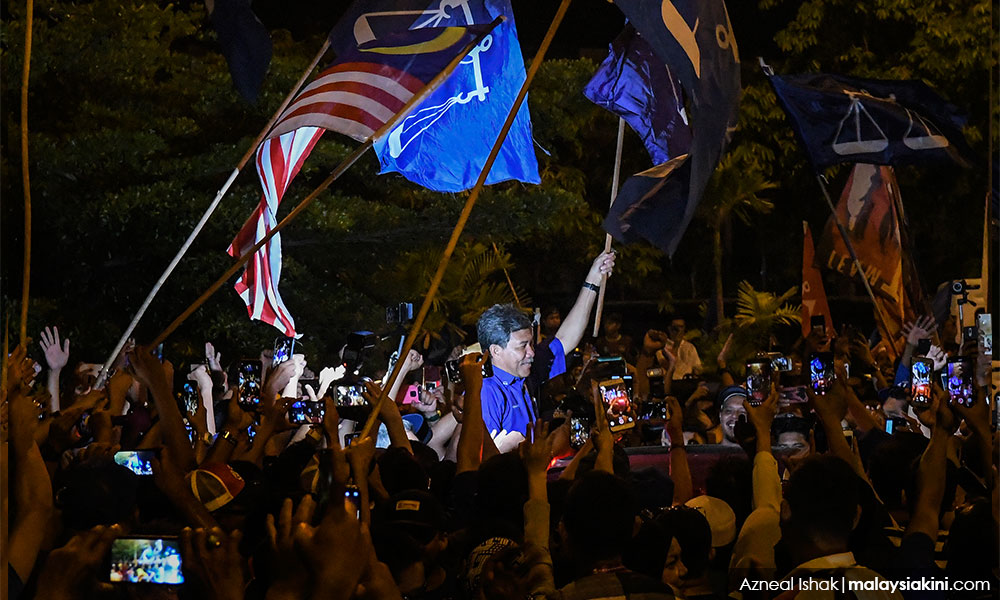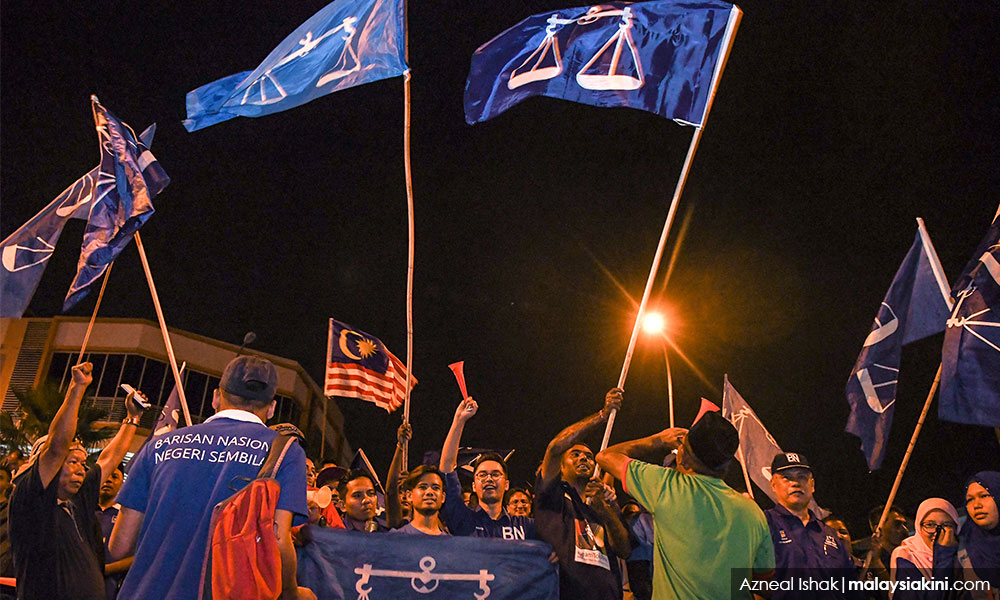
QUESTION TIME | More worrisome than losing the last three by-elections - Cameron Highlands, Seminyih and Rantau - is Harapan’s steadily declining support from Chinese and Indians, on top of the already minority support of the Malays.
The Umno/PAS axis will get majority support from Malays in many seats. Coupled with Harapan’s steadily declining support among non-Malays, even mixed seats with a large proportion of non-Malay residents, such as Rantau, can no longer be taken for granted.
Rantau was an uphill task considering that it was a BN stronghold and held by the previously most powerful person in Negeri Sembilan, Mohamad Hasan, former menteri besar and current acting Umno president.
With all the negativity currently surrounding Harapan and their meek surrender to Malay extremism with respect to the highly public ICERD and the Rome Statute issues, Harapan has not endeared itself to the non-Malays.
Also, if what they hoped for from their weak stance in terms of doing right, and not keeping to election manifesto promises, is to gain more Malay support, that did not materialise and is not likely to do so in future.
This is no shock because it is tough to be as extreme as Umno and PAS are in terms of Malay rights. The two allies stoop to all sorts of allegations about how Malay rights are being trampled upon, but instead of countering the lies, Harapan tried to go one up on them, a strategy doomed from the start.
Rantau surprised not because Harapan lost, but the magnitude of the loss, indicating clear erosion of support for Harapan not just from Malays, but from Chinese and Indians as well. The by-election result (see table below) indicates a return to the situation in 2013.
By GE14 last year, PAS had left the Harapan coalition, but crucially did not join or ally with Umno, thus splitting the Malay vote three ways. This enabled Harapan to win many seats, especially mixed seats with solid 80-90 percent support from non-Malays.

In Rantau, Dr S Streram (above) was rated as having only an outside chance of winning against incumbent Mohamad Hasan. The by-election was held because the courts held that Streram was not given a chance to contest in the general election on May 9, 2018, which Mohamad Hasan went on to win unopposed.
Mohamad garnered a majority in the recent by-election with a creditable margin of 4,510 votes. Two independents lost their deposits with less than 100 votes each. This is a near identical result to that of 2013 when he beat PKR’s Aisah Lamsah in a straight fight by 5,513 votes.

But considering that PAS in the 2019 by-election was aligned with Umno, whereas in 2013 it was aligned with PKR and DAP, Harapan did better this time around as PAS supporters would have probably voted for Umno, but not anywhere near close enough to win the election.
The dynamics in by-election changed drastically since GE14 due to two main factors - one, Umno and PAS are allies, which they were not in GE14, and two, the about-turns of Harapan against expressed policies and measures post-GE14, resulting in erosion of support, especially among non-Malays.
Even an announcement of the realignment of the East Coast Rail Link to pass through Negeri Sembilan, the state where Rantau is, did little to turn around voter sentiment. The resumption of this project in itself was a Harapan U-turn after PM Dr Mahathir Mohamad had announced earlier, and firmly, that the project was scrapped because the government could not afford it.
The remarkable thing about the Rantau by-election this time was that Harapan was defeated in all but one polling district. The only polling district Harapan retained was Bandar Ekar, which has the highest proportion of Chinese voters (42.1 percent) and third highest proportion of Indian voters (35.4 percent) in Rantau, as Malaysiakini reported.
Even so, Harapan's support in Bandar Ekar saw a decline from 70.3 percent in the last general election (parliamentary level) to 60 percent in this by-election. This was in contrast to Harapan capturing half of the 14 polling districts in the last general election at the parliamentary level, a clear indication of the erosion of support.
BN swept 13 of the polling districts in this by-election, including Pekan Sagga (63.7 percent Indians) and Linsum (48.3 percent Indians), which have the highest and second highest proportion of Indian voters in Rantau.

This must indicate a sharp deterioration in Indian support for Harapan, which may have been caused by the poor handling of the Seafield temple riots, where officialdom seemed over-eager to put the blame for the fireman’s death on Indian rioters. It raises questions of whether the position of Indians has changed since the change in government.
In Malay-majority areas, BN won by a landslide, including Kampung Bemban (91 percent Malays), Kampung Sega (86.1 percent Malays), Kampung Sendayan (80.3 percent Malays), Malaysiakini reported, indicating continuing poor Malay support for Harapan.
Harapan’s main problem is it is standing on middle ground and not committing firmly to what it has promised. It has further alienated Malays and even more so the non-Malays who voted for it very strongly, hoping for a good deal via an incorruptible, fair and efficient government free of patronage, which will unambiguously include everyone as equal partners in Malaysia.
What the Harapan leadership under Mahathir has not done effectively is to convince the Malays that none of their rights and privileges will be taken away, but their lot will improve by leaps and bounds when corruption and theft are weeded out.
Also, there was no firm assurance and action to show more effort will be made to improve education and solid measures imposed to stimulate the economy, bridge income gaps and give a better, balanced life for all Malaysians. This is the original message, from the start of the reform movement in 1998, that Harapan has championed.
If Harapan continues to ignore its promises for reform and focuses on satisfying instead the demands of extreme, and in some cases corrupt Malays who want an easy feed of patronage projects, it will lose support from a large section of moderate Malays, in addition to non-Malays.
Unless Harapan seriously changes tack and goes back to the basics on which it was elected, they are bound to lose GE15. Umno/PAS combined is a formidable foe which must not be underestimated.
They can’t use Umno/PAS tactics to gain Malay support. They need to reassure Malays that their rights will be preserved and explain how their lot will be improved by a less corrupt and more efficient government.
Harapan has no middle ground - it has to live on its reform promise, stick to its ideals and start executing. That’s what Malaysians voted them in for, not another Umno-like patronage peddling political entity that becomes increasingly corrupt over the years.
P GUNASEGARAM says for reform to take place, we all have to make our stand known. - Mkini



No comments:
Post a Comment
Note: Only a member of this blog may post a comment.